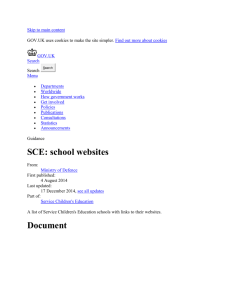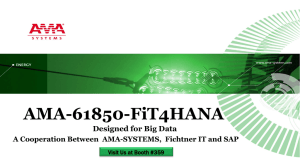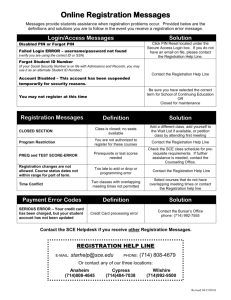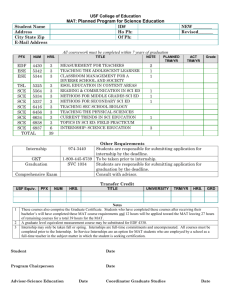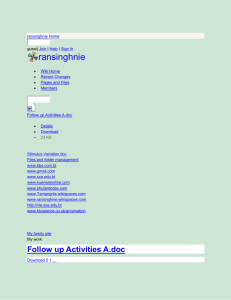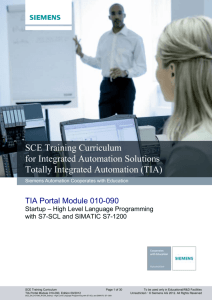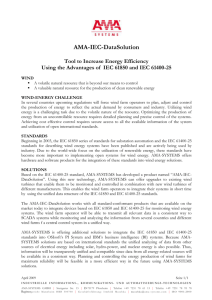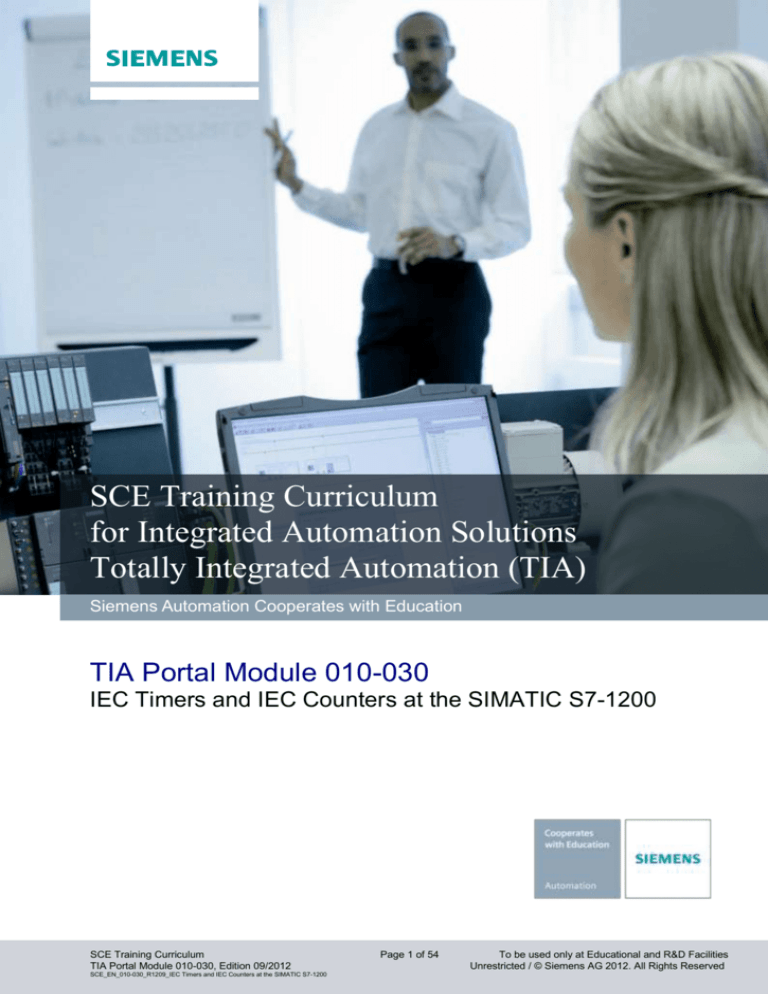
Industry Sector, IA&DT
SCE Training Curriculum
for Integrated Automation Solutions
Totally Integrated Automation (TIA)
Siemens Automation Cooperates with Education
TIA Portal Module 010-030
IEC Timers and IEC Counters at the SIMATIC S7-1200
SCE Training Curriculum
TIA Portal Module 010-030, Edition 09/2012
SCE_EN_010-030_R1209_IEC Timers and IEC Counters at the SIMATIC S7-1200
Page 1 of 54
To be used only at Educational and R&D Facilities
Unrestricted / © Siemens AG 2012. All Rights Reserved
Industry Sector, IA&DT
Matching SCE training packages for these training curriculums
SIMATIC S7-1200 AC/DC/RELAY 6er "TIA Portal"
Order number: 6ES7214-1BE30-4AB3
SIMATIC S7-1200 DC/DC/DC 6er "TIA Portal"
Order number 6ES7214-1AE30-4AB3
SIMATIC S7-SW for Training STEP 7 BASIC V11 Upgrade (for S7-1200) 6er "TIA Portal"
Order number 6ES7822-0AA01-4YE0
Please note that these training packages are replaced with successor packages when necessary.
An overview of the currently available SCE packages is provided under: siemens.com/sce/tp
Continued Training
For regional Siemens SCE continued training, please contact your regional SCE contact person
siemens.com/sce/contact
Additional information regarding SCE
siemens.com/sce
Information regarding Usage
This SCE training curriculum for the integrated automation solution Totally Integrated Automation (TIA) was
prepared for the program "Siemens Automation Cooperates with Education (SCE)“ specifically for training
purposes for public education facilities and R&D facilities. Siemens AG does not guarantee the contents.
This document is to be used only for initial training on Siemens products/systems; i.e., it can be copied entirely
or partially and given to those being trained for usage within the scope of their training. Passing on as well as
copying this training curriculum and sharing its content is permitted within public training and advanced training
facilities for training purposes.
Exceptions require written permission
roland.scheuerer@siemens.com.
by
the
Siemens
AG
contact
person:
Roland
Scheuerer
Offenders will be held liable. All rights including translation are reserved, particularly if a patent is granted or a
utility model or design is registered.
Usage for industrial customer courses is explicitly not permitted. We do not consent to the training curriculums
being used commercially.
We wish to thank the Michael Dziallas Engineering Corporation and all other involved persons for their support
during the preparation of this training curriculum.
SCE Training Curriculum
TIA Portal Module 010-030, Edition 09/2012
SCE_EN_010-030_R1209_IEC Timers and IEC Counters at the SIMATIC S7-1200
Page 2 of 54
To be used only at Educational and R&D Facilities
Unrestricted / © Siemens AG 2012. All Rights Reserved
Industry Sector, IA&DT
PAGE
Contents
1.
2.
2.1
2.2
3.
3.1
3.2
4.
5.
6.
7.
Preface ........................................................................................................................................................ 4
Notes on Programming the SIMATIC S7-1200 .......................................................................................... 6
Automation System SIMATIC S7-1200 ...................................................................................................... 6
Programming Software STEP 7 Professional V11 (TIA Portal V11) .......................................................... 6
Instances and Multi-Instances when Programming the SIMATIC S7-1200 ............................................... 7
Instance Data Blocks/Single Instances....................................................................................................... 7
Multi-Instances ............................................................................................................................................ 9
Sample Task: Press Control with Timer and Instance DB ....................................................................... 11
Programming the Press with a Time Delay using the SIMATIC S7-1200 ................................................ 12
Sample Task for Conveyor Control with Counter and Multi-Instance ....................................................... 29
Programming the Conveyor with the SIMATIC S7-1200 .......................................................................... 30
SCE Training Curriculum
TIA Portal Module 010-030, Edition 09/2012
SCE_EN_010-030_R1209_IEC Timers and IEC Counters at the SIMATIC S7-1200
Page 3 of 54
To be used only at Educational and R&D Facilities
Unrestricted / © Siemens AG 2012. All Rights Reserved
Industry Sector, IA&DT
1.
Preface
Regarding its content, module SCE_EN_010-030 is part of the training unit ’Basics of PLC
Programming’ and represents a fast entry point for programming the SIMATIC S7 1200 with TIA
Portal.
Fundamentals of
PLC Programming
Module 010, Module 020
Simulation SIMIT
Module 150
Additional Functions
for PLC Programming
Module 030
More Programming
Languages
Module 040
Safety /Security
Systems Module 080
PROFIBUS PROFINET
Module060 Module070
Sensor Technology
Module 110
AS-Interface
Module 050
Process Visualization
(HMI) Module 090
Drives
Module 100
Training Objective:
In this module 010-030, the reader learns how to program the programmable logic controller (PLC)
SIMATIC S7-1200 using the programming tool TIA Portal. Module 010-030 provides the
fundamentals and shows in the steps below how it is done based on a detailed example. .
Installing the software and setting the program interface
Explanation of what a PLC is and how it processes
Configuration and operation of the PLC SIMATIC S7-1200
Creating, loading and testing a sample program
Prerequisites:
To successfully work through module 010-030, the following knowledge is assumed:
How to operate Windows
Basics of PLC programming with the TIA Portal (for example, Module 010-010 'Startup’
Programming the SIMATIC S7-1200 with TIA Portal V11)
Blocks for the SIMATIC S7-1200 (for example, Module 010-020 Block Types at the SIMATIC
S7-1200)
SCE Training Curriculum
TIA Portal Module 010-030, Edition 09/2012
SCE_EN_010-030_R1209_IEC Timers and IEC Counters at the SIMATIC S7-1200
Page 4 of 54
To be used only at Educational and R&D Facilities
Unrestricted / © Siemens AG 2012. All Rights Reserved
Industry Sector, IA&DT
Hardware and software required
1
2
3
4
PC Pentium 4, 1.7 GHz 1 (XP) – 2 (Vista) GB RAM, free disk storage approx. 2 GB
Operating system Windows XP Professional SP3/Windows 7 Professional/Windows 7
Enterprise/Windows 7 Ultimate/Windows 2003 Server R2/Windows Server 2008
Premium SP1, Business SP1, Ultimate SP1
Software STEP7 Professional V11 SP1 (Totally Integrated Automation (TIA) Portal V11)
Ethernet connection between PC and CPU 315F-2 PN/DP
PLC SIMATIC S7-1200; for example CPU 1214C.
The inputs have to be brought out to a panel.
1 PC
2 STEP7 Professional
V11
(TIA-Portal)
3 Ethernet connection
4 S7-1200 with
CPU 1214C
SCE Training Curriculum
TIA Portal Module 010-030, Edition 09/2012
SCE_EN_010-030_R1209_IEC Timers and IEC Counters at the SIMATIC S7-1200
Page 5 of 54
To be used only at Educational and R&D Facilities
Unrestricted / © Siemens AG 2012. All Rights Reserved
Industry Sector, IA&DT
2.
Notes on Programming the SIMATIC S7-1200
2.1
Automation System SIMATIC S7-1200
The SIMATIC S7-1200 automation system is a modular mini-control system for the lower and
medium performance range.
An extensive module spectrum is available for optimum adaptation to the automation task.
The S7 controller consists of a power supply, a CPU, and input and output modules for digital and
analog signals.
If necessary, communication processors and function modules are used for special tasks, such as
step motor control.
With the S7 program, the programmable logic controller (PLC) monitors and controls a machine or a
process; the IO modules are polled in the S7 program by means of the input addresses
(%I), and addressed by means of output addresses (%Q).
The system is programmed with the software STEP 7.
2.2
Programming Software STEP 7 Professional V11 (TIA Portal V11)
The software STEP 7 Professional V11 (TIA Portal V11) is the programming tool for the automation
systems
-
SIMATIC S7-1200
-
SIMATIC S7-300
-
SIMATIC S7-400
-
SIMATIC WinAC
With STEP 7 Professional V11, the following functions can be utilized to automate a plant:
-
Configuring and parameterizing the hardware
-
Defining communication
-
Programming
-
Testing, commissioning and service with the operating/diagnostic functions
-
Documentation
-
Generating visual displays for the SIMATIC basic panels with integrated WinCC Basic
-
With additional WinCC packages, visualization solutions for PCs and other panels can be
generated
All functions are supported with detailed online help.
SCE Training Curriculum
TIA Portal Module 010-030, Edition 09/2012
SCE_EN_010-030_R1209_IEC Timers and IEC Counters at the SIMATIC S7-1200
Page 6 of 54
To be used only at Educational and R&D Facilities
Unrestricted / © Siemens AG 2012. All Rights Reserved
Industry Sector, IA&DT
3.
Instances and Multi-Instances when Programming the SIMATIC S7-1200
Calling a function block is referred to as instance. To each call of a function block, an instance data
block is assigned that is used for data storage. The actual parameters and the static data are stored
here.
The variables declared in the function block determine the structure of the instance data block.
Applying single and multi-instances
Instance data blocks can be assigned as follows:
Call as single instance:
- A separate instance data block for each instance of a function block
Call as multi-instance:
- One instance data block for several instances of one or several function blocks
3.1
Instance Data Blocks/Single Instances
The call of a function block to which its own instance data block is assigned is referred to as single
instance.
If the function block was generated according to the rules for standard blocks (refer to Module 010020), it can be called multiple times.
However, for each call as single instance, you have to assign a different instance data block.
SCE Training Curriculum
TIA Portal Module 010-030, Edition 09/2012
SCE_EN_010-030_R1209_IEC Timers and IEC Counters at the SIMATIC S7-1200
Page 7 of 54
To be used only at Educational and R&D Facilities
Unrestricted / © Siemens AG 2012. All Rights Reserved
Industry Sector, IA&DT
Example of single instances:
The figure below shows two motors being controlled with a function block FB10 and two different
data blocks:
The different data for the individual motors -for example, speed, power-up time, total operating timeis stored in the different instance data blocks DB10 and DB11.
OB1
FC1
Call FC1
DB10
Call FB10
with instance
DB10
for controlling
Motor1
FB10
Standard block
with program
Motor
Instance DB for
first call with data
for Motor1
DB11
Call FB10
with instance
DB11
to control
Motor2
FB10
Standard block
with program
Motor
Instance DB for
second call with
data for Motor2
Note
Some instructions such as timers and counters behave like function blocks. If they are called, they
also represent instances and need an assigned memory area; in the form of an instance data block,
for example.
SCE Training Curriculum
TIA Portal Module 010-030, Edition 09/2012
SCE_EN_010-030_R1209_IEC Timers and IEC Counters at the SIMATIC S7-1200
Page 8 of 54
To be used only at Educational and R&D Facilities
Unrestricted / © Siemens AG 2012. All Rights Reserved
Industry Sector, IA&DT
3.2
Multi-Instances
Because of the memory capacity of the CPUs used, it is possible that you want to or you can allocate
only a limited number of data blocks for instance data.
If in your user program, additional already existing function blocks, timers, counters, etc. are called in
a function block, it is possible to call these additional function blocks without their own (that is,
additional) instance DBs.
Simply select the call options ’Multi-Instance’:
Notes:
For a function block that was called, multi-instances make it possible to place its data in the instance
data block of the function block that is calling.
The block that is calling always has to be a function block in this case.
In this way, you concentrate the instance data in one instance data block; i.e., you can utilize the
available number of DBs more efficiently.
This, by the way, always has to be done if the block that is calling is to be reusable as a standard
block.
SCE Training Curriculum
TIA Portal Module 010-030, Edition 09/2012
SCE_EN_010-030_R1209_IEC Timers and IEC Counters at the SIMATIC S7-1200
Page 9 of 54
To be used only at Educational and R&D Facilities
Unrestricted / © Siemens AG 2012. All Rights Reserved
Industry Sector, IA&DT
Example for Multi-Instances:
The figure below shows a counter of the type CTUD (up and down counter) being called twice..
The different data for the two counters is stored as different multi-instances in instance data block
DB1 of the calling function block FB1.
OB1
Call FB1
with instance
DB1
DB1
FB1
Call #Counter1
as multi-instance
Call #Counter2
as multi-instance
Instance DB for
FB1
Here, as static
variables (STAT),
the memory for
Counter1 and
Counter2 is
provided as multiinstance
Counter1
of the type CTUD
Counter2
of the type CTUD
SCE Training Curriculum
TIA Portal Module 010-030, Edition 09/2012
SCE_EN_010-030_R1209_IEC Timers and IEC Counters at the SIMATIC S7-1200
Page 10 of 54
To be used only at Educational and R&D Facilities
Unrestricted / © Siemens AG 2012. All Rights Reserved
Industry Sector, IA&DT
4.
Sample Task: Press Control with Timer and Instance DB
For our program, a timer will be added to the press control in Module 010-010.
The task to be performed is as follows:
A press with a safety fence is to be started with a START button S3 only if the safety fence is closed.
This state is monitored with a sensor Safety fence closed B1.
If this is the case, a 5/2 way valve M0 for the press cylinder is activated so that a plastic shape can
be pressed.
The press is to retract again when the EMERGENCY OFF button (NC) is operated, or the sensor
Safety Fence B1 no longer responds.
If the sensor Cylinder extended B2 responds, the press is to retract again after a press time of 5
seconds.
An instance DB is used as the memory for the timer.
Assignment list:
Address
Symbol
Comment
%I 0.1
%I 0.3
%I 0.4
%I 0.5
%Q 0.0
EMERGENCY OFF
S3
B1
B2
M0
EMERGENCY OFF button NC
Start button S3 NO
Sensor Safety fence closed NO
Sensor Cylinder extended NO
Extend Cylinder A
Emerg.OFF
SCE Training Curriculum
TIA Portal Module 010-030, Edition 09/2012
SCE_EN_010-030_R1209_IEC Timers and IEC Counters at the SIMATIC S7-1200
Page 11 of 54
To be used only at Educational and R&D Facilities
Unrestricted / © Siemens AG 2012. All Rights Reserved
Industry Sector, IA&DT
5.
Programming the Press with a Time Delay using the SIMATIC S7-1200
The software 'Totally Integrated Automation Portal’ manages the project and does the
programming.
Here, under a uniform interface, the components such as the controller, visualization and networking
the automation solution are set up, parameterized and programmed.
Online tools are provided for error diagnosis.
.
In the steps that follow, a project can be opened for the SIMATIC S7-1200, it can be stored under a
different name and adapted to the new requirement.
1. The central tool is the ’Totally Integrated Automation Portal’. Here, we call it with a double
click. ( Totally Integrated Automation Portal V11)
SCE Training Curriculum
TIA Portal Module 010-030, Edition 09/2012
SCE_EN_010-030_R1209_IEC Timers and IEC Counters at the SIMATIC S7-1200
Page 12 of 54
To be used only at Educational and R&D Facilities
Unrestricted / © Siemens AG 2012. All Rights Reserved
Industry Sector, IA&DT
2.
The project "startup“ from Module 010-010 is now opened in the portal view as the basis for
this program. ( Open existing project startup open)
SCE Training Curriculum
TIA Portal Module 010-030, Edition 09/2012
SCE_EN_010-030_R1209_IEC Timers and IEC Counters at the SIMATIC S7-1200
Page 13 of 54
To be used only at Educational and R&D Facilities
Unrestricted / © Siemens AG 2012. All Rights Reserved
Industry Sector, IA&DT
3. Next, 'First Steps’ for the configuration are suggested. We want to ’Open project view’. (
Open project view)
SCE Training Curriculum
TIA Portal Module 010-030, Edition 09/2012
SCE_EN_010-030_R1209_IEC Timers and IEC Counters at the SIMATIC S7-1200
Page 14 of 54
To be used only at Educational and R&D Facilities
Unrestricted / © Siemens AG 2012. All Rights Reserved
Industry Sector, IA&DT
4.
First, we want to save the project under another name. ( Project Save as)
SCE Training Curriculum
TIA Portal Module 010-030, Edition 09/2012
SCE_EN_010-030_R1209_IEC Timers and IEC Counters at the SIMATIC S7-1200
Page 15 of 54
To be used only at Educational and R&D Facilities
Unrestricted / © Siemens AG 2012. All Rights Reserved
Industry Sector, IA&DT
5.
Now, ’Save’ the project under the new name ’press_timer’. ( press_timer Save)
SCE Training Curriculum
TIA Portal Module 010-030, Edition 09/2012
SCE_EN_010-030_R1209_IEC Timers and IEC Counters at the SIMATIC S7-1200
Page 16 of 54
To be used only at Educational and R&D Facilities
Unrestricted / © Siemens AG 2012. All Rights Reserved
Industry Sector, IA&DT
6. To make the changes, open the block ’program press[FC1]’ with a double click. ( program
press[FC1])
SCE Training Curriculum
TIA Portal Module 010-030, Edition 09/2012
SCE_EN_010-030_R1209_IEC Timers and IEC Counters at the SIMATIC S7-1200
Page 17 of 54
To be used only at Educational and R&D Facilities
Unrestricted / © Siemens AG 2012. All Rights Reserved
Industry Sector, IA&DT
7. Now we can start changing the program.
When generating our solution with the delay, we need an ON delay ’TON’. It is located under
’Instructions’ in the folder ’Timer operations’. If you point with the mouse to an object such as the
time TON, details about this object will be provided. ( Instructions Timer operations TON)
SCE Training Curriculum
TIA Portal Module 010-030, Edition 09/2012
SCE_EN_010-030_R1209_IEC Timers and IEC Counters at the SIMATIC S7-1200
Page 18 of 54
To be used only at Educational and R&D Facilities
Unrestricted / © Siemens AG 2012. All Rights Reserved
Industry Sector, IA&DT
8. If you highlight an object and then press the button ’F1’ on your PC, online help regarding this
object is displayed in a window to the right. ( F1)
Note
Here, go to online help where details are provided about all timer functions.
SCE Training Curriculum
TIA Portal Module 010-030, Edition 09/2012
SCE_EN_010-030_R1209_IEC Timers and IEC Counters at the SIMATIC S7-1200
Page 19 of 54
To be used only at Educational and R&D Facilities
Unrestricted / © Siemens AG 2012. All Rights Reserved
Industry Sector, IA&DT
9. Next, drag the timer ’TON’ with the mouse to the third contact of the OR function behind the
variable ’#cylinder_extended’ ( TON #cylinder_extended)
SCE Training Curriculum
TIA Portal Module 010-030, Edition 09/2012
SCE_EN_010-030_R1209_IEC Timers and IEC Counters at the SIMATIC S7-1200
Page 20 of 54
To be used only at Educational and R&D Facilities
Unrestricted / © Siemens AG 2012. All Rights Reserved
Industry Sector, IA&DT
10. For the timing function we need memory. Here, it can be made available only by generating a
new instance data block as a ’Single instance’. ( OK)
Note
Multi-instances can be used only when programming within a function block. This will be shown
below in the example for the IEC counter.
SCE Training Curriculum
TIA Portal Module 010-030, Edition 09/2012
SCE_EN_010-030_R1209_IEC Timers and IEC Counters at the SIMATIC S7-1200
Page 21 of 54
To be used only at Educational and R&D Facilities
Unrestricted / © Siemens AG 2012. All Rights Reserved
Industry Sector, IA&DT
11. Now, connect the time delay ’TON’ with the time base ’t#5s’ for 5 seconds. By clicking on
, the project is saved. ( t#5s
SCE Training Curriculum
TIA Portal Module 010-030, Edition 09/2012
SCE_EN_010-030_R1209_IEC Timers and IEC Counters at the SIMATIC S7-1200
Page 22 of 54
)
To be used only at Educational and R&D Facilities
Unrestricted / © Siemens AG 2012. All Rights Reserved
Industry Sector, IA&DT
Program in function block diagram (FBD)
Program in ladder diagram (LAD)
SCE Training Curriculum
TIA Portal Module 010-030, Edition 09/2012
SCE_EN_010-030_R1209_IEC Timers and IEC Counters at the SIMATIC S7-1200
Page 23 of 54
To be used only at Educational and R&D Facilities
Unrestricted / © Siemens AG 2012. All Rights Reserved
Industry Sector, IA&DT
12. To load your entire program into the CPU, highlight the folder ’controller_press’ and then click
on the symbol
Load to device. ( controller_press
SCE Training Curriculum
TIA Portal Module 010-030, Edition 09/2012
SCE_EN_010-030_R1209_IEC Timers and IEC Counters at the SIMATIC S7-1200
Page 24 of 54
)
To be used only at Educational and R&D Facilities
Unrestricted / © Siemens AG 2012. All Rights Reserved
Industry Sector, IA&DT
13. If the CPU is in the ’RUN’ mode, you will be asked whether you want to take it to the ’STOP’
mode. Confirm with ’OK’. ( OK)
14. If you omitted to specify the PG/PC interface beforehand, a window is displayed where you can
do this now. ( PG/PC interface for loading Load)
SCE Training Curriculum
TIA Portal Module 010-030, Edition 09/2012
SCE_EN_010-030_R1209_IEC Timers and IEC Counters at the SIMATIC S7-1200
Page 25 of 54
To be used only at Educational and R&D Facilities
Unrestricted / © Siemens AG 2012. All Rights Reserved
Industry Sector, IA&DT
15. Confirm ’Load’ once more. During loading, the status is shown in a window. ( Load)
16. If loading was successful, it is displayed in a window. Now click on ’Finish’. ( Finish)
SCE Training Curriculum
TIA Portal Module 010-030, Edition 09/2012
SCE_EN_010-030_R1209_IEC Timers and IEC Counters at the SIMATIC S7-1200
Page 26 of 54
To be used only at Educational and R&D Facilities
Unrestricted / © Siemens AG 2012. All Rights Reserved
Industry Sector, IA&DT
17. Next, start the CPU by clicking on the symbol
. (
)
18. Confirm the question whether you actually want to start the CPU with ’OK’. ( OK)
SCE Training Curriculum
TIA Portal Module 010-030, Edition 09/2012
SCE_EN_010-030_R1209_IEC Timers and IEC Counters at the SIMATIC S7-1200
Page 27 of 54
To be used only at Educational and R&D Facilities
Unrestricted / © Siemens AG 2012. All Rights Reserved
Industry Sector, IA&DT
19. By clicking on the symbol
Monitoring on/off you can, while the program is tested, observe
the status of the timer as well as the time that expired. (
SCE Training Curriculum
TIA Portal Module 010-030, Edition 09/2012
SCE_EN_010-030_R1209_IEC Timers and IEC Counters at the SIMATIC S7-1200
Page 28 of 54
)
To be used only at Educational and R&D Facilities
Unrestricted / © Siemens AG 2012. All Rights Reserved
Industry Sector, IA&DT
6.
Sample Task for Conveyor Control with Counter and Multi-Instance
When blocks are to be generated that are working in any program like a "Black Box“ as it were, they
have to be programmed by using variables. In this case, the following rule applies: that in these
blocks, no absolute-addressed inputs/outputs, flags etc. must be used. Within the block, only
variables and constants are used.
If secondary function blocks -or timers/counters- are called from a block that can be used multiple
times, they must not be assigned their own data block.
The required memory is provided as multi-instance within the instance DB that is assigned to the
function block doing the calling.
In the example below, we add a bottle counter to the function block that already contains a conveyor
control dependent on the operating mode.
With this conveyor, 20 bottles are to be transported to a case. When the case is full, the conveyor is
stopped and the case has to be exchanged.
With the button 'S1', we want to select the operating mode 'Manual’, and with the button 'S2' the
operating mode 'Automatic’.
In the operating mode 'Manual’, the motor is switched on as long as the button 'S3’ is operated;
button 'S4’ must not be operated.
In the operating mode 'Automatic’, the conveyor motor is switched on with button 'S3' and switched
off with button 'S4' (break contact).
In addition, there is a sensor 'B0’ that counts the bottles into the case. After counting 20 bottles, the
conveyor is stopped.
When a new case is put in place, this has to be confirmed with the button 'S5’.
Assignment list:
Address
Symbol
Comment
%I 0.0
%I 0.1
%I 0.2
%I 0.3
%I 0.6
%I 0.7
%Q 0.2
S1
S2
S3
S4
S5
B0
M1
Button operating mode Manual S1 NO
Button operating mode Automatic S2 NO
On button S3 NO
Off button S4 NC
Button S5 NO Reset counter/new case
Sensor B0 NO bottle counter
Conveyor motor M1
SCE Training Curriculum
TIA Portal Module 010-030, Edition 09/2012
SCE_EN_010-030_R1209_IEC Timers and IEC Counters at the SIMATIC S7-1200
Page 29 of 54
To be used only at Educational and R&D Facilities
Unrestricted / © Siemens AG 2012. All Rights Reserved
Industry Sector, IA&DT
7.
Programming the Conveyor with the SIMATIC S7-1200
The ’Totally Integrated Automation Portal’ software manages the project and does the
programming.
Here, under a uniform interface, the components such as controller, visual display and networking of
the automation solution are set up, parameterized and programmed. Online tools are provided for
error diagnosis.
In the steps below, for the SIMATIC S7-1200 a project can be opened, stored under a different name
and adapted to the new requirement.
1. The central tool is the ’Totally Integrated Automation Portal’. Here, we call it with a double
click. ( Totally Integrated Automation Portal V11)
SCE Training Curriculum
TIA Portal Module 010-030, Edition 09/2012
SCE_EN_010-030_R1209_IEC Timers and IEC Counters at the SIMATIC S7-1200
Page 30 of 54
To be used only at Educational and R&D Facilities
Unrestricted / © Siemens AG 2012. All Rights Reserved
Industry Sector, IA&DT
2. We now open the project "FB_conveyor“ from Module 010-020 in the portal view as the basis
for this program. ( Open existing project FB_conveyor Open)
SCE Training Curriculum
TIA Portal Module 010-030, Edition 09/2012
SCE_EN_010-030_R1209_IEC Timers and IEC Counters at the SIMATIC S7-1200
Page 31 of 54
To be used only at Educational and R&D Facilities
Unrestricted / © Siemens AG 2012. All Rights Reserved
Industry Sector, IA&DT
3. Next, ’First Steps’ are suggested for the configuration. We want to ’Open project view’. (
Open project view)
SCE Training Curriculum
TIA Portal Module 010-030, Edition 09/2012
SCE_EN_010-030_R1209_IEC Timers and IEC Counters at the SIMATIC S7-1200
Page 32 of 54
To be used only at Educational and R&D Facilities
Unrestricted / © Siemens AG 2012. All Rights Reserved
Industry Sector, IA&DT
4.
Now, we first save the project under a different name. ( Project Save as)
SCE Training Curriculum
TIA Portal Module 010-030, Edition 09/2012
SCE_EN_010-030_R1209_IEC Timers and IEC Counters at the SIMATIC S7-1200
Page 33 of 54
To be used only at Educational and R&D Facilities
Unrestricted / © Siemens AG 2012. All Rights Reserved
Industry Sector, IA&DT
5. Next, ’Save’ the project under the new name ’FB_conveyor_counter’. (
FB_conveyor_counter Save)
SCE Training Curriculum
TIA Portal Module 010-030, Edition 09/2012
SCE_EN_010-030_R1209_IEC Timers and IEC Counters at the SIMATIC S7-1200
Page 34 of 54
To be used only at Educational and R&D Facilities
Unrestricted / © Siemens AG 2012. All Rights Reserved
Industry Sector, IA&DT
6. To set up new global variables, open with a double click on ’PLC tags’ under the
’controller_conveyor’ ’Default tag table. ( controller_conveyor PLC tags Default tag table)
SCE Training Curriculum
TIA Portal Module 010-030, Edition 09/2012
SCE_EN_010-030_R1209_IEC Timers and IEC Counters at the SIMATIC S7-1200
Page 35 of 54
To be used only at Educational and R&D Facilities
Unrestricted / © Siemens AG 2012. All Rights Reserved
Industry Sector, IA&DT
7. Change the tag table according to the default setting.
Next, set up the two global variables ’B0’ and ’S5’. ( B0/Bool/%I0.7/sensor bottle counter
S5/Bool/%I0.6/reset counter/new box)
8.
To make the changes in the program, open the block ’conveyor[FB1]’ with a double click.
( conveyor[FB1])
SCE Training Curriculum
TIA Portal Module 010-030, Edition 09/2012
SCE_EN_010-030_R1209_IEC Timers and IEC Counters at the SIMATIC S7-1200
Page 36 of 54
To be used only at Educational and R&D Facilities
Unrestricted / © Siemens AG 2012. All Rights Reserved
Industry Sector, IA&DT
9.
First, add two rows under Interface for the input variables. ( Interface Input Add row)
SCE Training Curriculum
TIA Portal Module 010-030, Edition 09/2012
SCE_EN_010-030_R1209_IEC Timers and IEC Counters at the SIMATIC S7-1200
Page 37 of 54
To be used only at Educational and R&D Facilities
Unrestricted / © Siemens AG 2012. All Rights Reserved
Industry Sector, IA&DT
10. When declaring the local variables, we are adding the following variables.
Input:
sensor_bottle
reset_counter
SCE Training Curriculum
TIA Portal Module 010-030, Edition 09/2012
SCE_EN_010-030_R1209_IEC Timers and IEC Counters at the SIMATIC S7-1200
Here, the sensor of the bottle counter is polled
Here, the signal for resetting the counter is entered
Page 38 of 54
To be used only at Educational and R&D Facilities
Unrestricted / © Siemens AG 2012. All Rights Reserved
Industry Sector, IA&DT
11. Now we can start changing the program.
As we generate our solution with the counter, we need a down counter ’CTD’. It is located under
’Instructions’ in the folder ’Counters’. If you point with the mouse to an object such as the counter
CTD, you will be provided with detailed information about this object. ( Instructions Counters
CTD)
SCE Training Curriculum
TIA Portal Module 010-030, Edition 09/2012
SCE_EN_010-030_R1209_IEC Timers and IEC Counters at the SIMATIC S7-1200
Page 39 of 54
To be used only at Educational and R&D Facilities
Unrestricted / © Siemens AG 2012. All Rights Reserved
Industry Sector, IA&DT
12. If you highlight an object and then press the ’F1’ key on your PC, online help regarding this
object is displayed in a window to the right. ( F1)
Note
Here, go to online help to obtain the details about all counters.
SCE Training Curriculum
TIA Portal Module 010-030, Edition 09/2012
SCE_EN_010-030_R1209_IEC Timers and IEC Counters at the SIMATIC S7-1200
Page 40 of 54
To be used only at Educational and R&D Facilities
Unrestricted / © Siemens AG 2012. All Rights Reserved
Industry Sector, IA&DT
13. Now, first insert an AND between OR and assignment, and then drag the counter ’CTD’ to the
second contact of the AND function. ( & CTD)
14.
We need memory for the counter function. Here, the function block makes it available within the
instance data block as ’Multi-Instance’, without generating a new instance data block. ( MultiInstance
OK)
Note
A multi-instance can be used only when programming within a function block.
SCE Training Curriculum
TIA Portal Module 010-030, Edition 09/2012
SCE_EN_010-030_R1209_IEC Timers and IEC Counters at the SIMATIC S7-1200
Page 41 of 54
To be used only at Educational and R&D Facilities
Unrestricted / © Siemens AG 2012. All Rights Reserved
Industry Sector, IA&DT
SCE Training Curriculum
TIA Portal Module 010-030, Edition 09/2012
SCE_EN_010-030_R1209_IEC Timers and IEC Counters at the SIMATIC S7-1200
Page 42 of 54
To be used only at Educational and R&D Facilities
Unrestricted / © Siemens AG 2012. All Rights Reserved
Industry Sector, IA&DT
15. Now, connect the down counter ’CTD’ to the specified value ’PV’ for the 20 bottles and connect
the input ’CD’ to ’#sensor_bottle’, and the input ’LD’ to ’#reset_counter’. Next, negate the second
contact of the AND function.
Click on
and the project will be saved.
( 20 #sensor_bottle #reset_counter
)
Note
The down counter is most suitable for counting specified quantities, since simply the binary output
’Q’ can be used for further connections. Otherwise, a comparator would have to be programmed.
SCE Training Curriculum
TIA Portal Module 010-030, Edition 09/2012
SCE_EN_010-030_R1209_IEC Timers and IEC Counters at the SIMATIC S7-1200
Page 43 of 54
To be used only at Educational and R&D Facilities
Unrestricted / © Siemens AG 2012. All Rights Reserved
Industry Sector, IA&DT
Program in function block diagram (FBD)
Program in ladder diagram (LAD)
SCE Training Curriculum
TIA Portal Module 010-030, Edition 09/2012
SCE_EN_010-030_R1209_IEC Timers and IEC Counters at the SIMATIC S7-1200
Page 44 of 54
To be used only at Educational and R&D Facilities
Unrestricted / © Siemens AG 2012. All Rights Reserved
Industry Sector, IA&DT
16.
Now, open the block ’Main[OB1]’ to update the call of block ’conveyor[FB1]’ ( Main[OB1] )
SCE Training Curriculum
TIA Portal Module 010-030, Edition 09/2012
SCE_EN_010-030_R1209_IEC Timers and IEC Counters at the SIMATIC S7-1200
Page 45 of 54
To be used only at Educational and R&D Facilities
Unrestricted / © Siemens AG 2012. All Rights Reserved
Industry Sector, IA&DT
17. In the block ’Main[OB1]’, click with the right mouse key on "conveyor“ and then on ’Update’.
( Main[OB1] Update)
SCE Training Curriculum
TIA Portal Module 010-030, Edition 09/2012
SCE_EN_010-030_R1209_IEC Timers and IEC Counters at the SIMATIC S7-1200
Page 46 of 54
To be used only at Educational and R&D Facilities
Unrestricted / © Siemens AG 2012. All Rights Reserved
Industry Sector, IA&DT
18. Next, select the ’New Interface’ and confirm with ’OK’. ( New interface OK)
SCE Training Curriculum
TIA Portal Module 010-030, Edition 09/2012
SCE_EN_010-030_R1209_IEC Timers and IEC Counters at the SIMATIC S7-1200
Page 47 of 54
To be used only at Educational and R&D Facilities
Unrestricted / © Siemens AG 2012. All Rights Reserved
Industry Sector, IA&DT
19. Now connect the two new input variables to the PLC tags “B0” and “S5” shown here. Then click
on
, and the project will be saved. (
SCE Training Curriculum
TIA Portal Module 010-030, Edition 09/2012
SCE_EN_010-030_R1209_IEC Timers and IEC Counters at the SIMATIC S7-1200
Page 48 of 54
)
To be used only at Educational and R&D Facilities
Unrestricted / © Siemens AG 2012. All Rights Reserved
Industry Sector, IA&DT
Program in function block diagram (FBD)
Program in ladder diagram (LAD)
SCE Training Curriculum
TIA Portal Module 010-030, Edition 09/2012
SCE_EN_010-030_R1209_IEC Timers and IEC Counters at the SIMATIC S7-1200
Page 49 of 54
To be used only at Educational and R&D Facilities
Unrestricted / © Siemens AG 2012. All Rights Reserved
Industry Sector, IA&DT
20. To load your entire program into the CPU, highlight the folder ’controller_conceyor’, and then
click on the symbol
Load to device. ( controller_conveyor
SCE Training Curriculum
TIA Portal Module 010-030, Edition 09/2012
SCE_EN_010-030_R1209_IEC Timers and IEC Counters at the SIMATIC S7-1200
Page 50 of 54
)
To be used only at Educational and R&D Facilities
Unrestricted / © Siemens AG 2012. All Rights Reserved
Industry Sector, IA&DT
21. Setting the Interface
22. Confirm ’Load’ once more. During loading, the status is displayed in a window. ( Load)
SCE Training Curriculum
TIA Portal Module 010-030, Edition 09/2012
SCE_EN_010-030_R1209_IEC Timers and IEC Counters at the SIMATIC S7-1200
Page 51 of 54
To be used only at Educational and R&D Facilities
Unrestricted / © Siemens AG 2012. All Rights Reserved
Industry Sector, IA&DT
23. If loading was successful, it is displayed in a window. Click on ’Finish’. ( Finish)
SCE Training Curriculum
TIA Portal Module 010-030, Edition 09/2012
SCE_EN_010-030_R1209_IEC Timers and IEC Counters at the SIMATIC S7-1200
Page 52 of 54
To be used only at Educational and R&D Facilities
Unrestricted / © Siemens AG 2012. All Rights Reserved
Industry Sector, IA&DT
24. Next, start the CPU by clicking on the symbol
.
25. Confirm the question whether you actually want to start the CPU with ’OK’. ( OK)
SCE Training Curriculum
TIA Portal Module 010-030, Edition 09/2012
SCE_EN_010-030_R1209_IEC Timers and IEC Counters at the SIMATIC S7-1200
Page 53 of 54
To be used only at Educational and R&D Facilities
Unrestricted / © Siemens AG 2012. All Rights Reserved
Industry Sector, IA&DT
26. By clicking on the symbol
program is tested.
SCE Training Curriculum
TIA Portal Module 010-030, Edition 09/2012
SCE_EN_010-030_R1209_IEC Timers and IEC Counters at the SIMATIC S7-1200
Monitoring On/Off, you can observe the counter status while the
Page 54 of 54
To be used only at Educational and R&D Facilities
Unrestricted / © Siemens AG 2012. All Rights Reserved
Industry Sector, IA&DT
27. By clicking on the symbol
program is tested.
SCE Training Curriculum
TIA Portal Module 010-030, Edition 09/2012
SCE_EN_010-030_R1209_IEC Timers and IEC Counters at the SIMATIC S7-1200
Monitoring On/Off, you can observe the open data block while the
Page 55 of 54
To be used only at Educational and R&D Facilities
Unrestricted / © Siemens AG 2012. All Rights Reserved

